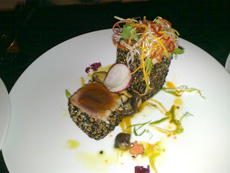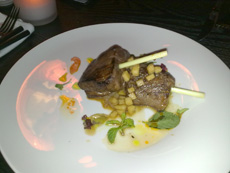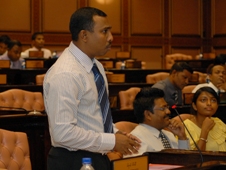The sale of the Holiday Inn business in Male’ to the Hong Kong-based Shangri-La group is to be completed by the end of November.
The current management were “working closely” with the new owners to “ensure a smooth transition”, said the hotel’s General Manager Michael Melzer.
Holiday Inn’s resort at Kandooma would be unaffected, he said.
The hotel will meanwhile be rebranded from the InterContinental Hotels Group’s mid-scale Holiday Inn brand once the hotel is handed to Shangri-La, presumably to the group’s business hotel brand Traders.
The landmark hotel was opened in September last year, the first international hotel chain to open in Male’.
Staff were informed in October of the decision by the owners, Male Hotel Associates, to sell the business to an international group. The Dhivehi Observer reported that the sum paid was US$42 million for the assets and business of the remainder of the building’s 27 year lease.
Despite opening to great fanfare the flagship Male’ hotel was quickly demonised through a series of cultural blunders, including advertising a BBQ and DJ during Friday prayers on the day of the lunar eclipse in January, but most notably its efforts to acquire a liquor license.
Liquor license denied
In November 2009 the Economic Development Ministry announced new regulations whereby individual liquor licences would be scrapped and instead issued to hotels on inhabited islands with more than 100 beds.
Adhil Saleem, state minister for economic development, confirmed in November that Holiday Inn had applied for a liquor licence, and the hotel quickly became a symbol for an anti-alcohol push by the Islamic Ministry and the government’s coalition partner, the Adhaalath Party, which appealed for no alcohol to be sold on inhabited islands.
Confusing matters, in December parliament voted 28-23 against a bill that would have outlawed the sale of alcohol on inhabited islands. Oddly, a number of MPs who argued vehemently for the bill then voted against it.
Among the MPs who opposed the legislation were Thohdhoo MP Ali Waheed, Galolhu South MP Ahmed Mahlouf, Vili-Maafanu MP Ahmed Nihan, Mid-Henveiru MP Ali Azim, Villigili MP Mohamed Ramiz, Feydhoo MP Alhan Fahmy of the DRP and Maavashu MP Abdul Azeez Jamal Abukaburu and Isdhoo MP Ahmed Rasheed Ibrahim from the People’s Alliance.
The Economic Development Ministry meanwhile argued that lax monitoring of the liquor permits had resulted in a black market for alcohol in the capital Male’.
But, the Ministry’s revised regulations were withdrawn following public pressure before it could be enforced and were sent to a parliamentary committee for consultation.
Under the regulations, tourist hotels in inhabited islands with more than 100 beds would have been authorised to sell alcohol to foreigners, but the hotel bar was to not be visible from outside or to employ Maldivians.
In February, the matter came to a head with a series of protests against the legislation, and as the primary symbol of the new regulations, the Holiday Inn reportedly received a number of bomb threats.
State Minister for Islamic Affairs and Adhaalath party spokesman Mohamed Shaheem Ali Saeed, one of the leaders of the protest, threatened to resign his post in the ministry along with other senior people if the government approved the regulation.
Sheikh Ilyas Hussain also spoke to the protesters, warning that the former government had been changed because it had “walked in the wrong path”.
If the new government also chose the wrong path, he warned, “we might have to work to change the government.”
Gauging public sentiment, the government withdrew the controversial regulations following a meeting attended by the Maldives Police Service, Maldives National Defence Force (MNDF), the Home Affairs Ministry, the Economic Development Ministry, the Ministry of Islamic Affairs and several religious scholars.
At the same time the government did not reinstate the old liquor licensing system, resulting in burgeoning black market prices for the commodity – the street price for a bottle of blackmarket vodka wholesaled outside the country for US$6 rose from Rf 700 (US$54) to Rf 2000 (US$160) with the demise of the licensing system.
State Minister for Islamic Affairs Sheikh Mohamed Shaheem Ali Saeed said at the time that while there was scope for alcohol to be sold to non-Muslims in an Islamic state, alcohol was readily available to non-Muslims at resorts and the Hulhule Island Hotel (HIH) on the airport island.
“The tourism industry has sold alcohol [to non-Muslims] for a long time,” he explained. “But it is a concern to open bars in [wider Maldivian] society. Maldivians do not want to have bars near schools and mosques.”
Financial impact
The loss of potential liquor revenues drew speculation that the Holiday Inn would suffer financially.
Melzer said today that in his experience of managing the hotel for five months, “it has not affected us. We have very imaginative beverage menus that have been very successful, and there has not been a negative impact.”
The hotel was not in direct competition with the bar-equipped Hulhule Island Hotel (HIH), he said: “The main target of the hotel is corporate business and government travellers, and to a lesser extent the international wholesale market – particularly South Korea and Japan.”
The base business of the hotel was showing “very good progress” he said, with the main attraction “the high quality interior design, which is very luxurious and well received by international travellers from SE Asia and the Middle East. Another attraction is definitely the rooftop restaurant with its magnificent views and innovative dining concept.”
He acknowledged that one of the hotel’s key challenges “was attracting and retaining the right talent.”
“One of my areas of emphasis has been to localise positions,” he said, “but generally in the Maldives it is hard to attract local talent.”
Shangri-La, which already runs an upmarket resort property in Addu Atoll, has yet to announce its intentions for the rebranded hotel.
Correction: An earlier version of this article incorrectly stated that the Holiday Inn property was being sold together with the business. The property itself will remain with the present owner of the premises.
 (0)Dislikes
(0)Dislikes (0)
(0)

